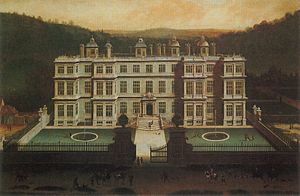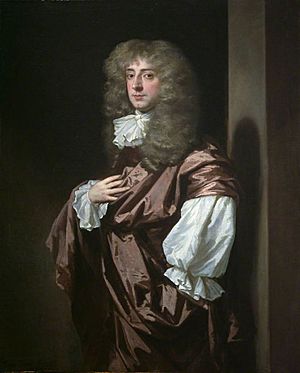Henry Thynne (1675–1708) facts for kids


Henry Thynne (born February 8, 1675 – died December 20, 1708) was an English politician. He was a member of the Tory party. He served in the English and later the British House of Commons from 1701 until his death in 1708.
Henry Thynne's Early Years
Henry Thynne was born on February 8, 1675. He was the oldest of three sons. His father was Thomas Thynne, 1st Viscount Weymouth. The family owned a large estate called Longleat in Wiltshire and Gloucestershire. His mother was Lady Frances Finch. Henry was christened on February 16, 1675.
He was educated at home. Henry loved books and literature. In 1692, he traveled to the Netherlands, Germany, and Italy. As a young man, he taught French and Italian to Elizabeth Singer Rowe. She was a writer who later became famous.
In 1695, Henry married Grace Strode. She was the daughter of Sir George Strode. Grace brought a large sum of money, about £20,000, to their marriage. A poet named Anne Finch, Countess of Winchilsea, wrote a poem about Henry and Grace. In the poem, Henry was called "Theanor" and Grace was called "Cleone."
Henry Thynne's Time in Parliament
Henry Thynne first tried to become a Member of Parliament (MP) in 1695. He ran for the area of Weobley but was not successful. He didn't try again for several years.
In 1701, he ran for Parliament again. He tried for both Weobley and Weymouth and Melcombe Regis. He didn't win in Weobley. However, he was elected as an MP for Weymouth. He was a Tory politician.
Henry Thynne was not a very active MP. He was known for being against preparing for war with France. Later in 1701, he was elected for Tamworth. He chose to represent Tamworth. He was re-elected as MP for Weymouth and Melcombe Regis in 1702.
He became less involved in Parliament over time. In 1708, he was elected for two areas, Weymouth and Weobley. He chose to sit for Weymouth. He served as an MP until his sudden death later that year.
Later Life and Family Connections
Henry Thynne died suddenly on December 20, 1708. He was buried on January 3, 1709, in Longbridge Deverill.
After his death, doctors found he had several health issues. He had not complained about feeling unwell before he died. Just hours before his death, he told his family he felt fine.
Henry Thynne had two daughters. His daughter Frances Thynne married Algernon Seymour, 7th Duke of Somerset. His other daughter, Mary Thynne, married William Greville, 7th Baron Brooke. Henry Thynne's grandchildren included Elizabeth Percy, Duchess of Northumberland.
 | Jackie Robinson |
 | Jack Johnson |
 | Althea Gibson |
 | Arthur Ashe |
 | Muhammad Ali |

